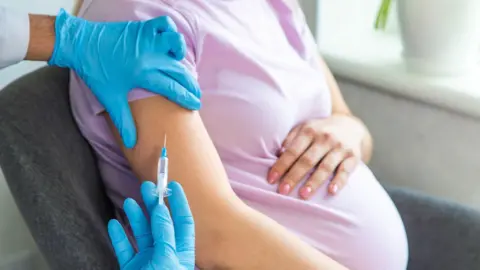RSV vaccine rollout to avoid 'tripledemic'
 Getty Images
Getty ImagesThe NHS is encouraging pregnant women and older people to get vaccinated against respiratory syncytial virus (RSV) to avoid a "tripledemic" of RSV, flu and Covid-19.
As part of its winter vaccination programme, the NHS in Humber and North Yorkshire is offering the vaccines to women who are at least 28 weeks pregnant and people aged 75 to 79.
RSV is a common infection that causes coughs and colds, but can sometimes be serious for babies and older adults.
The health service's vaccination scheme will also include a rollout of flu and Covid-19 vaccines.
'Vitally important'
Dr Nigel Wells, executive director of NHS Humber and North Yorkshire Integrated Care Board, said it was "vitally important" that eligible people get their vaccines to "help avoid a possible tripledemic" as viruses peak in winter.
UK Health Security Agency data shows an increase in RSV across most age groups.
The virus is not usually serious but some babies or vulnerable adults have a higher risk of getting seriously ill.
RSV can lead to bronchiolitis, meaning symptoms can get worse. The data shows an increase in bronchiolitis among children.
Jen Brownbridge, lead nurse at Humber and North Yorkshire Health and Care Partnership, said: "Bronchiolitis is usually manageable at home. You may need to seek medical advice if your child’s symptoms become worse, but for most children they will start to feel better after the first week."
Symptoms of RSV
According to the NHS, symptoms of an RSV infection can include:
- A runny or blocked nose
- A cough
- A high temperature
- Sneezing
- Tiredness
- Sweatiness and shivering
If RSV leads to a more serious infection, such as bronchiolitis, it may also cause:
- A worsening cough
- Shortness of breath
- Wheezing
- Loss of appetite
- Confusion (in older adults)
How to avoid RSV
RSV is spread through coughs and sneezes. To reduce chances of it spreading, the NHS advises people to:
- Clean surfaces regularly
- Try to avoid touching your eyes, nose or mouth
- Use disposable tissues and throw them away as soon as they have been used
- Keep newborn babies away from anyone with a cold or flu
- Wash or wipe down children's toys
Pregnant women can get vaccinated by request at their local GP practice but those who are over 28 weeks' pregnant are advised to speak to health professionals before receiving their vaccine.
Older adults will be invited by their local GP practice as part of the rollout.
Listen to highlights from Hull and East Yorkshire on BBC Sounds, watch the latest episode of Look North or tell us about a story you think we should be covering here.
